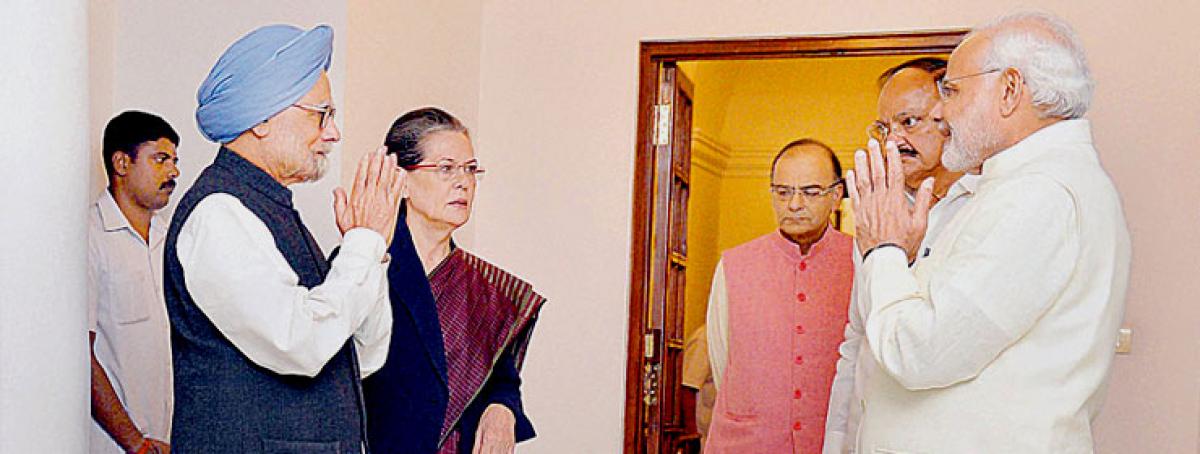Live
- Summer skincare secrets: Protect your skin from sun and heat
- Forces within & outside the country joined hands to defeat me, PM Modi says in Karnataka
- SSC results to be released on April 22
- Fake currency seized from house along India-Bangladesh border in Bengal
- District Transport Officer Chinna Balu seized 15 vehicles for driving against the rules
- Won't withdraw complaint against Amanatullah Khan over non-compliance of summons: ED to Delhi court
- Awareness seminar on Sakhi services and control of child marriage
- Fortify area domination tactics to cover vulnerable areas: IGP Kashmir
- From breast cancer to brain, DNA damage - here's how ethylene oxide can affect your health
- EPFO adds 15.48 lakh net members in February as employment rises
Just In

x
Highlights
The winter of 2015 is indeed very different from its predecessor. Things were a lot more \'Modi\'fied last year, what with the confidence of the mandate and the \'honeymoon period\' of the new government. The Opposition was down in the dumps, making it less effective in the Parliament.
The winter of 2015 is indeed very different from its predecessor. Things were a lot more 'Modi'fied last year, what with the confidence of the mandate and the 'honeymoon period' of the new government. The Opposition was down in the dumps, making it less effective in the Parliament.
.jpg)
But how things change in one year. After the defeats in Delhi and Bihar, and the government's inability to pass the bills of its choice in the last two sessions, seem to have taught a lesson to the man in the hot seat, Prime Minister Narendra Modi.
The PM now seems to have decided to be more parliamentarian. His tone is lower, his voice softer. The arrogant, often rude, body language has been superseded by words like 'inclusiveness' and 'collaboration'. Indeed, Modi has changed his tactics after what seems like an 18-month-long hangover. Lower tone, softer voice - Modi has changed tactics after what seems like an 18-month hangover.
Before the two-day long special session to discuss commitment to the Constitution, part of the 125th birth anniversary celebrations of its architect, Dr BR Ambedkar, the PM reflected warmth and a welcoming attitude towards other parties.
A day before the special session, on Wednesday, 25 November, he listened to the opposition sincerely, in an effort to find a passage for his bills, especially in the Rajya Sabha, where the NDA is in minority. Modi spoke to Congress leaders like Leader of the Opposition Mallikarjun Khadge and displayed a positive body language. He then urged the opposition that passing the GST Bill is in the interests of the nation. Modi has begun reaching out to opposition leaders to break the parliamentary deadlockThe U-turn by Modi and Co. has surprised many within the BJP as well. The BJP Parliamentary Party executive meeting had surprise attendees this time, in sidelined veterans LK Advani and Murli Manohar Joshi. Both were invited, since Modi knows this is important to control the discontent within the BJP after the heavy Bihar defeat…
Then, on both days of the special sitting, Modi attended the speeches made by senior leaders in both Houses. This is very unlike the Modi of 2014. In the winter session last year, the face of the government was missing for the most part. In fact, he is still among the top names when it comes to absence from Parliament…
As he sat listening to the speeches over the last two days, his bonhomie and softness came as a surprise to many. Though other NDA MPs raised their voices often while reacting to the speeches, Modi's address on Friday was full of praise for past and present members of the House belonging to other parties.
Modi praised Jawaharlal Nehru for his great contribution to the country. He said that being in majority didn't mean anything could be imposed on the people. He told the House that he is, apparently, the first PM to say it from the Red Fort that every party and every PM since independence has contributed to the making of India.
Without mentioning Rahul Gandhi's name, he praised the Congress scion's political moves. He also acknowledged that the same quote of Ambedkar that he was using had also been used by Sonia Gandhi in her speech on Thursday. Previously, Modi had not given an account of his frequent foreign trips to the House. But in this special session, the PM decided to brief the House about developments. In doing so, Modi finally followed in his predecessors' footsteps.
And then, at the end of the session, on Friday, the PM invited Congress president Sonia Gandhi and former PM Manmohan Singh for high tea at his residence, 7 Race Course Road. Both leaders attended and discussed key issues related to the winter session. Finance Minister Arun Jaitley and Naidu were also present…These are not isolated, unconnected moves. All this shows that Modi is changing his tactics, in order to get his way with legislation. But the only problem is that the Opposition won't roll over just because he's being nice to it. Elections are set to be held in five states over the next six months, and the Opposition will have to decide its parliamentary strategy keeping that in mind.
As a JD(U) leader said, "We understand the PM and the change in his tactics. We are not going to fall into the trap."
(Courtesy: http://www.catchnews.com; Senior Assistant Editor at Catch, Panini is a poet, singer, cook, painter, commentator, traveller and photographer)
More On

Next Story
More Stories
ADVERTISEMENT
© 2024 Hyderabad Media House Limited/The Hans India. All rights reserved. Powered by hocalwire.com







